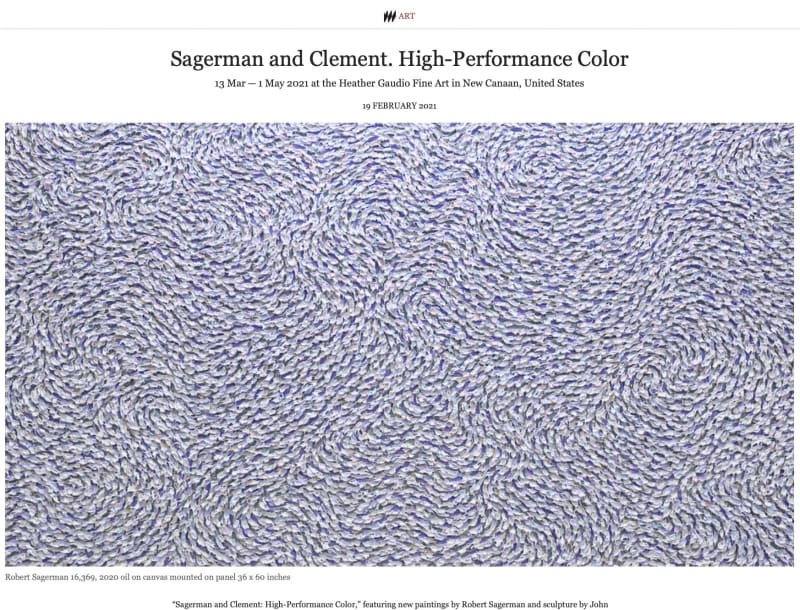“Sagerman and Clement: High-Performance Color,” featuring new paintings by Robert Sagerman and sculpture by John Clement. The show opens March 13th and will run through May 1st, 2021.
Whether using a palette knife or welding and cutting steel, Sagerman and Clement share a physicality in their processes, creating remarkable artworks that activate their environments with vivid colors.
Robert Sagerman is known for making arresting and intensely colored textural paintings. Mixing his own pigments, he carefully selects the palettes and works on several canvases at a time. Sagerman’s process is deliberate and methodical, painstakingly applying thick strokes of oil or silicone onto the surface in pointillist fashion, a single color at a time. Keeping track of every paint application and every color utilized, Sagerman documents each number as he builds up the abstract composition. Depending on the scale, his paintings can have anywhere from 50- 250 different colors. The canvases are typically 3-inches thick, becoming quasi sculptural in their own right and require a wood panel backing to support the weight of the material. The titles of the paintings correspond to the total number of pigment applications, which reach the thousands. Sagerman holds a Ph.D. in Hebrew and Judaic Studies and is inspired by medieval Jewish mysticism. Counting embodies a Kabbalist tradition, providing the artist with a form of meditation and a means to arrive to a state of clarity and transcendence. Working intuitively, Sagerman at times is surprised to discover unexpected color interactions and the direction his meditative process takes him.
For this exhibition, Sagerman has created richly colored and textured panels, as well as smaller works on paper. Painted this past year, these artworks express an exuberant palette and are more fluid and open than his previous series, which tended to be rigorous and monochromatic. Some paintings have markings applied horizontally while others possess swirling patterns undulating across the picture plane. They are delineated by grooves that appear to have been incised or carved into the surface, almost taking on the properties of topographic landscapes. The pigments are so intricately packed they draw the viewer in, and closer inspection reveals the contrasting colors are what render dimensionality to the works. Only with varying distance and vantage points can the viewer fully appreciate the skill and materiality that goes into these paintings. Sagerman has exhibited widely in the United States and abroad and his works are in many private and museum collections.
A lot of sculptors today have taken to newer technologies that facilitate creating works with relative ease. Not so for John Clement, who stands out among peers for continuing to embrace the dying artform of cutting and welding steel himself. As a young college graduate, Clement was fortunate to have apprenticed under the celebrated artists Mark di Suvero and John Henry. These experiences not only taught him the physical properties of the material, but also the dynamics of working with monumental-scale sculpture. When Clement broke out on his own, he translated his acquired knowledge to create sculpture in curvilinear forms. Made of steel pipes, the coils and arcs became his signature style, almost like drawings or doodles in space. Depending on the thickness of the pipes, the forms can suggest lithe scribbles or have a more audacious and gargantuan presence.
Clement’s three-dimensional works are striking with their bright colors derived from high-performance vehicle paint. Affixed to a base or the ground, the metallic circular gestures give the impression they can spin and be turned around, as if the interplay between positive and negative space is in motion. They energize the indoor or outdoor spaces they inhabit no matter their size. Clement is equally versed in offering the viewer more intimate discourses with smaller scaled objects, as he is working with the oversized, public artworks. Taken to a grander scale, the sculptures punctuate rigid and structured urban environments or brighten green or snow-covered pastoral fields. The show will feature new stainless steel free-standing sculpture intended for both indoor and outdoor spaces, as well as smaller forms that can be turned on their base. Also new to his practice are wall-mounted pieces, works that take the notion of drawings in space back into a two-dimensional plane. Clement has exhibited his sculptures extensively throughout the country and has worked on many site-specific public art commissions and corporate installations.


